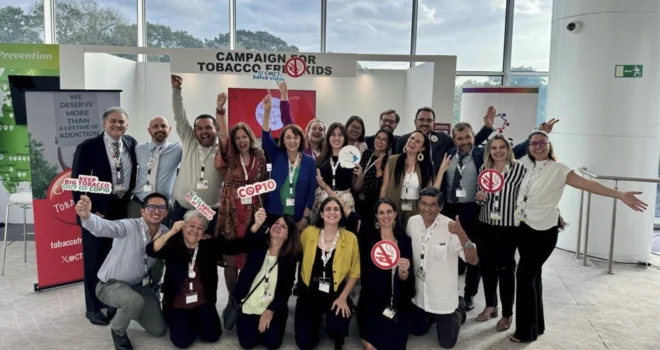From 13-16 July, the city of Addis Ababa hosted the Third International Conference on Financing for Development (FfD3). The conference brought together `high-level political representatives, including Heads of State and Government, and Ministers of Finance, Foreign Affairs and Development Cooperation’ to reach a globally agreed outcome on how to finance development over the next 15 years.
The World Heart Federation sent an advocacy delegation to join the 6,000 FfD3 attendees to ensure that health remained a top priority for international development resource mobilization. Alongside the main Conference Agenda, the team participated in 12 side meetings on financing for health, and were pleased to note the widespread receptiveness to Universal Health Coverage supported by financing mechanisms for NCDs, such as tobacco taxes.
During the FfD3 conference in Addis, the World Heart Federation made an intervention on the avoidable burden of youth unemployment despite insufficient health workforces in developing countries:
“The World Heart Federation is encouraged by the UN Secretary General Youth Envoy’s support of a push to ‘deliver health services that are tailored to youth needs’. Health stakeholders know that new or newly integrated services require a stronger health workforce. We also know that health workforces in developing countries can be understaffed, underskilled and unevenly remunerated. Would the Envoy support investment in youth employment within the health care sector, which so desperately needs employees and is, under the UN’s and WHO’s guidance, realigning itself to address youth needs? If so, how can we encourage Member States to enable young people to solve the problems they themselves face?”
Our intervention was answered by the UN Secretary General’s Envoy on Youth, who acknowledged the ‘need to redouble our efforts into implementing health services tailored for youth, especially for women and girls’ and pledged to ‘fully support young people being involved in the delivery of health care in their countries.’
The FfD3 meeting concluded with the adoption of an outcome document, known as the Addis Ababa Action Agenda, which can be considered a positive step in development financing by the CVD community. In the Agenda, Member States acknowledge the huge burden of NCDs on both developed and developing countries, and agree that a blend of domestic resource mobilization, official donor aid, and innovative financing is needed to reduce this burden. Particularly relevant to CVD is the Action Agenda’s support of tobacco taxation, and encouragement to Member States to strengthen implementation of the FCTC.
You can read UN Secretary-General Ban Ki-moon’s thoughts on the FfD3 outcomes here.


